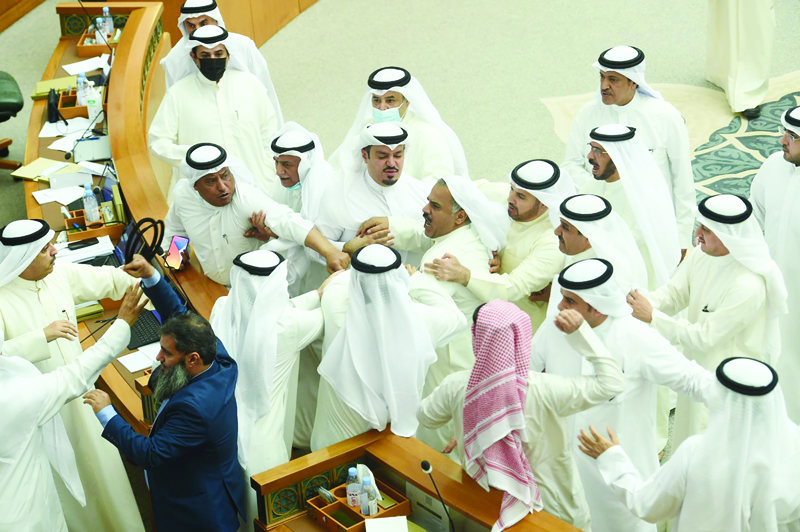 KUWAIT: MPs trade blows during a bad-tempered session of the National Assembly yesterday. - Photo by Yasser Al-Zayyat
KUWAIT: MPs trade blows during a bad-tempered session of the National Assembly yesterday. - Photo by Yasser Al-ZayyatBy B Izzak
KUWAIT: In a historic session that saw punches, quarrels and heated arguments from the start to the end, the National Assembly yesterday passed the state budget for the 2021/2022 fiscal with a KD 12.1 billion deficit. HH the Prime Minister Sheikh Sabah Al-Khaled Al-Sabah and most Cabinet ministers did not enter the chamber after opposition MPs occupied their seats, but they still voted while standing at the chamber's entrance, a first in Kuwait's 59 years of democracy.
The budget was passed without any technical debate and without reports by the budgets committee, controlled by opposition lawmakers, in perhaps the shortest session to debate the state budget. The budget was passed with a slim majority with 32 MPs, including 16 Cabinet ministers, in favor, and one against, while 30 opposition lawmakers refused to vote.
Head of the budgets committee MP Bader Al-Mulla asked the speaker how 32 members voted in favor of the budget when seven ministers were outside the chamber. The three-hour session was marred by non-stop shouting and heated arguments between opposition lawmakers and Assembly Speaker Marzouq Al-Ghanem and a minority of MPs who supported the government.
Two MPs, one from the opposition and another from the pro-government camp, exchanged punches that led to chaos and promoted Ghanem to call off the session prematurely, but after the budget had been approved. Throughout the session, no Cabinet minister spoke and Finance Minister Khalifa Hamada sat on the podium without making any statement.
At one point, angry opposition MPs went up to the podium, but the speaker called the guards, who prevented the lawmakers from approaching the speaker. Opposition MPs arrived early and occupied seats reserved for Cabinet ministers, a tactic they have used in recent weeks to highlight their demand to question the prime minister over a host of issues. But the ministers this time did not boycott the session as they did in three previous sessions, although they remained standing.
At the start, opposition MPs protested that the speaker cannot under the constitution hold a special session in place of the regular session. Ghanem immediately voted on a motion to turn the regular session into a special session amid massive protests by the opposition that his action clearly breached the constitution. But he did not stop. "We have the right to request a special session because all regular sessions have been disrupted," Ghanem said, referring to opposition tactics. In a special session, the prime minister cannot be questioned.
MP Obaid Al-Wasmi said the session was full of constitutional violations from the beginning to the end, while MP Hasan Jowhar accused the speaker of taking part in a "plot". MP Mubarak Al-Hajraf accused the prime minister and the speaker of collaborating "to play with the future of the Kuwaiti people". "The session witnessed a moral, popular and constitutional downfall of the government ... This government does not deserve to continue for another day," Hajraf said.
"The ghosts of the government and the prime minister voted on the budget while standing at the chamber's gate. This is shameful," MP Thamer Al-Suwait said. "It is humiliating for Cabinet ministers to stand at the gate. Voting for the budget is a stigma in the face of the government," MP Abdulkarim Al-Kandari said. "Our problem is not with the budget, it is with the government," MP Abdulaziz Al-Saqabi said.
Pro-government MPs however justified their support for the government over the need to pass the budget to allow new spending to serve the interests of the Kuwaiti people. They warned that failure to approve the new budget will block fresh spending on essential items like housing, salaries and development projects. The Assembly is scheduled to meet again today to debate the financial status of the country in a closed session. The government will brief MPs on the future generations and general reserve funds and other financial indicators in light of the sharp drop in oil prices.










